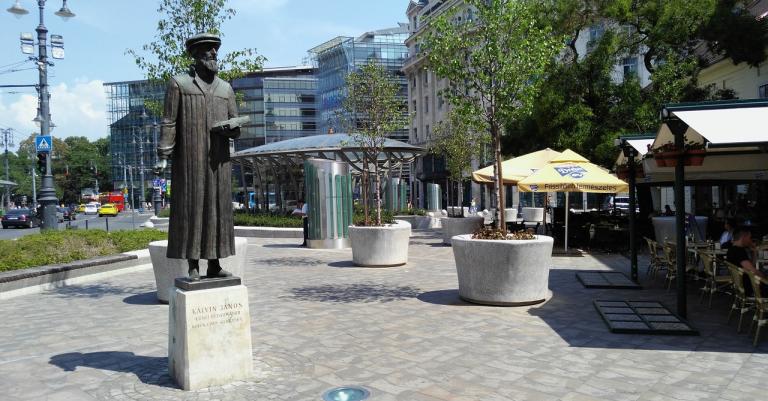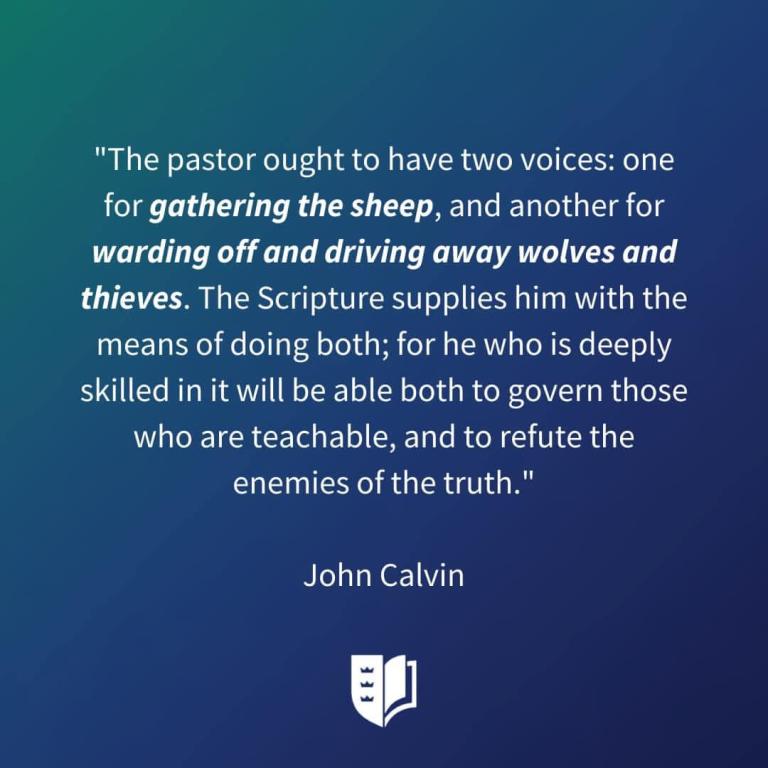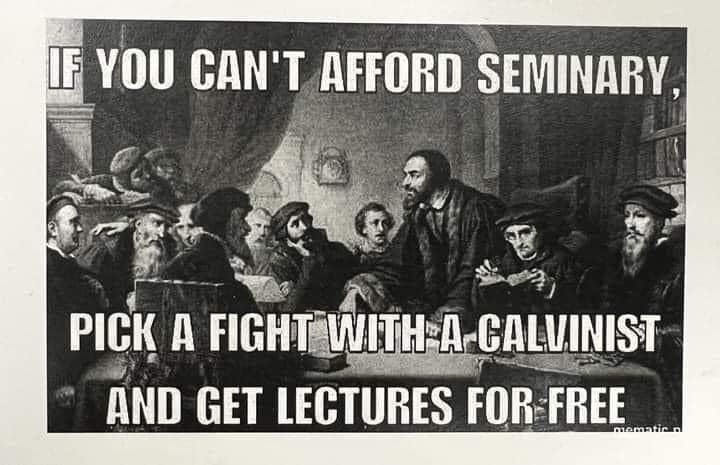There are Catholic philosophers, mystics, and leaders on the continent; especially from the 1,400’s onward; some from France, England, and Spain. Also some of them are prominent women. There are publications on the relational aspects of God’s nature.
For those who think I run to the Church Fathers too often, and for those who think I only deal out tiny blurbs on social networks, here is a longread (from memory) on some historical reflections on John Calvin who is the Continental Reformer arising from France.
I believe yesterday was International Fact-Checking Day, but I would pit the libraries I have access to against Wikipedia any day, the great socio-cultural compendium of our particular time. Message me if need be. I always appreciate professors who genuinely consider other viewpoints, even if a question arises in the middle of a lecture.
Martin Luther quotes the Early Church Fathers very often, as does John Calvin, perhaps the Latin Fathers moreso than the Primitive Church.
Huldrych Zwingli is coached by Erasmus. Both remain faithful to the church, reforming from within.
Erasmus writes the Textus Receptus Latin Bible translation, used by the church, and later as a basis for the King James Version.
Luther writes a treatise called On the Babylonian Captivity of the Church, among other works received by countless faith tribes today, including churches who are at odds in the era of the Continental Reformation. This is a work that delineates where the church is at, and how reform is needed on the continent. It also has an uncanny past and present, now and not yet, quality to it.
i. striding over a couple hurdles
There are Catholic philosophers, mystics, and leaders on the continent; especially from the 1,400’s onward; some from France, England, and Spain. Also some of them are prominent women. There are publications on the relational aspects of God’s nature.
Now, in light of developments during Vatican II and the Reformation 500th Anniversary, there is a growing renewal between ecclesial communities that are at odds during the Reformation.
It may not be a return to complete common ground yet, but it is better than nothing.
Our baptisms are all recognized, if proper discipleship or catechesis has taken place.
Furthermore, there are intentional hints, if one reads the language on the Lutheran site, the Vatican documents, and in canonical law; about next steps toward a reconciliation at the table with all the implications. This is a goal yet to be seen on a grand scale.
ii. on predestination
Luther basically says, “We’re all just wild asses that the Lord rides” (pardon my French or German). It’s transliteration, possibly from Latin; because I have a very difficult read in the library; and I know German shares a lot of English terminology.
Calvin is outside of France and starts following the call because a minister calls him into his version of the perfect will of God. He sends Calvin into mid- north Europe for a season of transition, and then he comes back to form the utopian society of Geneva.
Basically, Geneva becomes so perfect that people are excommunicated from other sects of Christianity, and eventually there are rumors of martyrs as well, as we see with John Wycliffe (the Morning Star of the English Reformation).
Perhaps this is one of the reasons, although there are a few political reasons (and politics is not a bad way of dealing with church polity at times), that Britain opts for a via media. It is rumored that the Wesley brothers study the Greek Fathers (Primitive Church) as their primary preference for Theological inquiry. If so, they could be drawing from earlier wells than Luther and Calvin.
iii. who are the Greek Fathers?
The list is definitely incomplete, but these are some I have read or know about. Really, the great Greek classic literature age lasts until the fall of the library in Athens after A.D. 500. I would say Church Theology is strong, with not a lot of contravariances with Reformation Theology, until A.D. 400.
Consider reading Perpetua and Felicita; Justin; Hermes; Clement; and Clement of Alexandria for early reads. John disciples Polycarp who disciples Irenaeus of Lyons (Gaul, France). Actual disciples and lady|s travel to Spain, then to France, perhaps around Montpellier as an entry point. There are Christian communities launched upnorth in France as well. Tradition holds that one of the Marys from the Gospel is among this troupe that traverses the Mediterranean as mariners. Is this one of the seedbeds for the mystics who come out of France, Spain, and even Britain (like Joan de Arc, Teresa of Avila, and Julian of Norwich)?
There are other lines of history and succession. All of these Patristics are well respected, some moreso in various ancient Christian circles. However, their reformative leadership has been felt throughout their time, and until ours.
They all live before Sarapion, who is on the dawn of the era of leaders like Nicholas, Jerome, Constantine, Augustine, the Cappodocian Fathers, Macrina, etc. Even Athanasias passes away between the two Nicene councils, after holding a regional Synod of his own on the Sonship of Christ and the Trinity, in cooperation with his fellows, and the Cappadocian Fathers.
iv. the contributions of Augustine
Then there is Augustine, who some claim to be the predecessor of predestination (a cardinal Continental Reformed doctrine if there ever was one). However, can everyone agree with Augustine? With all due respect, he doesn’t even speak Greek.
There are various opinions about City of God.
Confessions, especially if somebody has a well-translated recent version, is really a collection of the reflections of a Bishop looking back, to lift us up.
Nonetheless, there are some themes that are not in line with the Greek Fathers in his work either. If I could make my own confession, I don’t speak Greek. It’s not that it’s all Greek to me. I have good study tools, really good ones. However, it’s always transliteration; well I’m getting better; actually I’m quite good at it.
Augustine’s confessions are not confessions in the way we think of the word today, i.e. spewing our sins to people we may or may not trust. Confessions are ways of praising God per se for bringing us through; making a way when there seems to be no way; and offering our true testimonies, etc.
Perhaps Augustine’s mom and Ambrose should be studied a little more.
Perhaps one could also look at the strong possibility that Augustine could have penned Confessions as a Bishop at large in Africa. Why do some of these Bishops who have so much freedom upnorth, all of a sudden go off grid at times? There are deep studies and deep dives for inquiries like that, but Augustine was already a world traveler, philosopher, and orator in the empire before meeting Bishop Ambrose.
v. France, all points North, & possibly East?
John Calvin may be a world traveler as well. He is a genius for sure, writes “The Institutes” at about 28-ish.
Prior to this landmark achievement, he is commissioned by a minister over the Swiss border as he’s exiting France. He stays with the minister for awhile who mentors him. He heads north, to the best of our knowledge, making reformations in the interior of the continent.
There is some suggestive evidence that Calvin could have traveled east as well.

That’s a square dedicated to him in Budapest and there’s his icon.
I really can’t speak to the issue. I can say that revisionist history, as we know it, could have begun as early as the 1930’s (perhaps in the wake of the Great War, I really don’t know).
Although I do disagree with what some forms of Calvinism have become as a philosophy since that era, I truly admire Calvin’s brilliance and tenacity to spread the Gospel.
I know it is so yesteryear to say this, but I always have an issue with Calvinists who think they have some sort of special grace to be predestined to persevere to be greater Calvinist scholars than Calvin.
vi. rumours of rumblings in Calvin’s Geneva
It is thought that Geneva becomes a homogeneous institution when Calvin is finally fading. His cohort (or monolith – not a great term) is the only small group making all the decisions. People are detained or excommunicated, arguably some Christians who only have diverging points of doctrine, not all are heterodox.
Forgive me, but it’s nearly dark or totolitarian later-on in his story. There is not a balance of power when all the branches of societal or church cohorts are never up for re-election. At least this is one of the founding principles in some of the Americas. If one has the ability to remain aloof in a seat of power like a never-ending oligarchy, whether in church or society, then there is the possibility that the plebeians will see bad things happen.
vii. does Calvin’s Geneva become just another witch-hunt?
What about the pre-reformation thinkers per se natural law Thomists, mystics, Christian leaders of nation-states ampærsand monastic communal predecessors (male & female) of various forms of higher education, i.e. places like Geneva, etc.?
I have no problem per se with France, or other nearby allies, & the educational reformers who continue to the north after the Continental Reformation, &c.
Your preacher or professor may have repeated a quote like this, so it’s something you’ve possibly heard…

but I ask, are all wolves bad if they’re part of the created order?
Don’t some sheep have horns?
It’s semantics at times because the Continental Reformers have their own ways and means of Catechesis. Do modern reformers call it Catechesis?
Calvin is only a couple steps away from transubstantiation as well. Are the newer generations of reformers comfortable with that?
Forget the almighty T.U.L.I.P. for now, because I think Calvin’s lines of succession articulated it, not him. I could be mistaken.
viii. Did this article choose me? Did I choose this article?
Will anybody solve the dilemma of what God does in advance? There are obviously various ideas.
Is Augustine surprised when he possibly flees Milan? Remember he is considered to be one of the founding fathers of the doctrine of predestination. Does he just say as he leaves town, “Well, I didn’t see that one coming!”?
Asked in another way right now…
If you’re the type of person who likes to read a lot of blogs, then maybe the question is:
“Did your eyes choose to read this article?”…
or…
“Did some kind of algorithm, e-mail list, A.I., or the Patheos Evangelical Columnists list, place the writing before your eyes?”
CTA | whether you’ve chosen…
or whether you’ve been chosen…
[& I could see this all going on for a very long time]
…the idea of Biblical engagement with the readings is neither new to Christianity, nor to global religions throughout time.
I’m offering an invitation today to peer into my current Bible reading practices with my FREE plan and annotations.
CLICK HERE
- Bible Reading daté par procuration
- The designers include three components each day: 1) worship 2) word and 3) wisdom.
- Used with permission, paginated to fold and staple.
For other writings of this nature visit History or Mission
God is not too transcendent to speak through His Word today; and not removed from your everyday walk or the trajectory of your pedagogy.
Read it for yourself, or in Christian community, or God may send somebody to speak the word over your life, despite doctrinal differences that are fun to discuss for years to come…

I guess it’s better than nothing.













